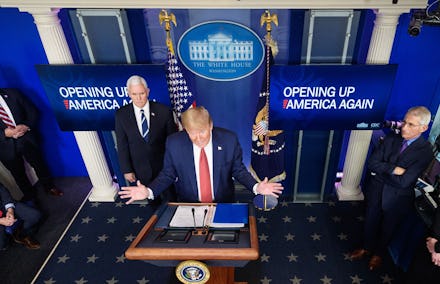Trump's long-awaited plan to reopen America is utterly nonsensical

President Trump finally unveiled his much ballyhooed plan for "Opening Up America Again" on Thursday, announcing a three-phase set of guidelines by which the country could, he said, claw its way back to something resembling normalcy in the wake of the coronavirus pandemic.
The guidelines — which offer both a broad framework for the easing up of pandemic-induced restrictions as well as long-standing nuggets of medical wisdom such as encouraging people to "sneeze or cough into a tissue, or the inside of your elbow" — ultimately lays the bulk of the responsibility and decision-making onto individual states themselves, acknowledging that "if [states] need to remain closed, we will allow them to do that."
"You’re going to call your own shots," Trump reportedly told governors during a conference call ahead of his Thursday evening press briefing announcing his plan — a whiplash-inducing about-face from a man who just days earlier asserted he has "total" authority over the country during this health crisis. On Monday, he'd literally said that "the president of the United States calls the shots" when faced with mounting pushback from governors who sought to dictate their own states' response.
But "if you look at Montana, Wyoming, North Dakota, that's a lot different than New York, it's a lot different than New Jersey" Trump told reporters Thursday, claiming that there were 29 states "in the ballgame" to reopen sooner rather than later. And speaking of ballgames, "our normal is if you have 100,000 people in an Alabama football game,” Trump said. “We want every seat occupied. Normal is not going to be where you have a game with 50,000 people." Experts have suggested that sports may resume over the summer at the earliest, but without fans and in controlled environments; whether college football could continue as scheduled in the fall is doubtful.
The president's plan, which isn't so much "bad" as it is merely an aspirational vision board with more technical language, reveals a broader truth about Trump's handling of the coronavirus pandemic: Despite his bluster and threats to the contrary, he has ultimately ceded any sort of actionable response to the states themselves, while simultaneously projecting a total and yet entirely hollow sense of leadership.
Even before giving the governors his blessing, states had already been laying out a patchwork response to coronavirus — largely in the absence of, or even in direct conflict with, leadership from the Trump administration. In fact, the same day Trump announced his guidelines, a consortium of Midwestern states (including two Republican governors) became the third such confederation create their own framework for reopening their regional economy, after similar efforts on both the West and East coasts. The moves came after other reportedly half-baked announcements from the administration, including a rambling roll-call Tuesday of business leaders and campaign donors whom, the president said, had joined a task force to address the lagging economy. A number of the alleged participants claimed to have had no idea they were involved in the president's plan.
Ultimately, though, Trump's preference for grandiose if toothless announcements affords him what he's spent a lifetime cultivating: a projected image of leadership with little actual accountability. As some White House aides have allegedly been crowing, by publicly announcing that he'd magnanimously granted the governors the authority to do what they'd already been doing, Trump has essentially given himself 50 new scapegoats for if (and more likely, when) something goes wrong.
Still, for a man who has insisted that the coronavirus pandemic has made him a "wartime" president, it's never too early to snatch unearned victory from the inevitable jaws of defeat. "We are in the next front of our war," Trump exclaimed during his press conference Thursday.
That same day America set a new record in that so-called "war": In just 24 hours, 4,591 people had died from coronavirus.